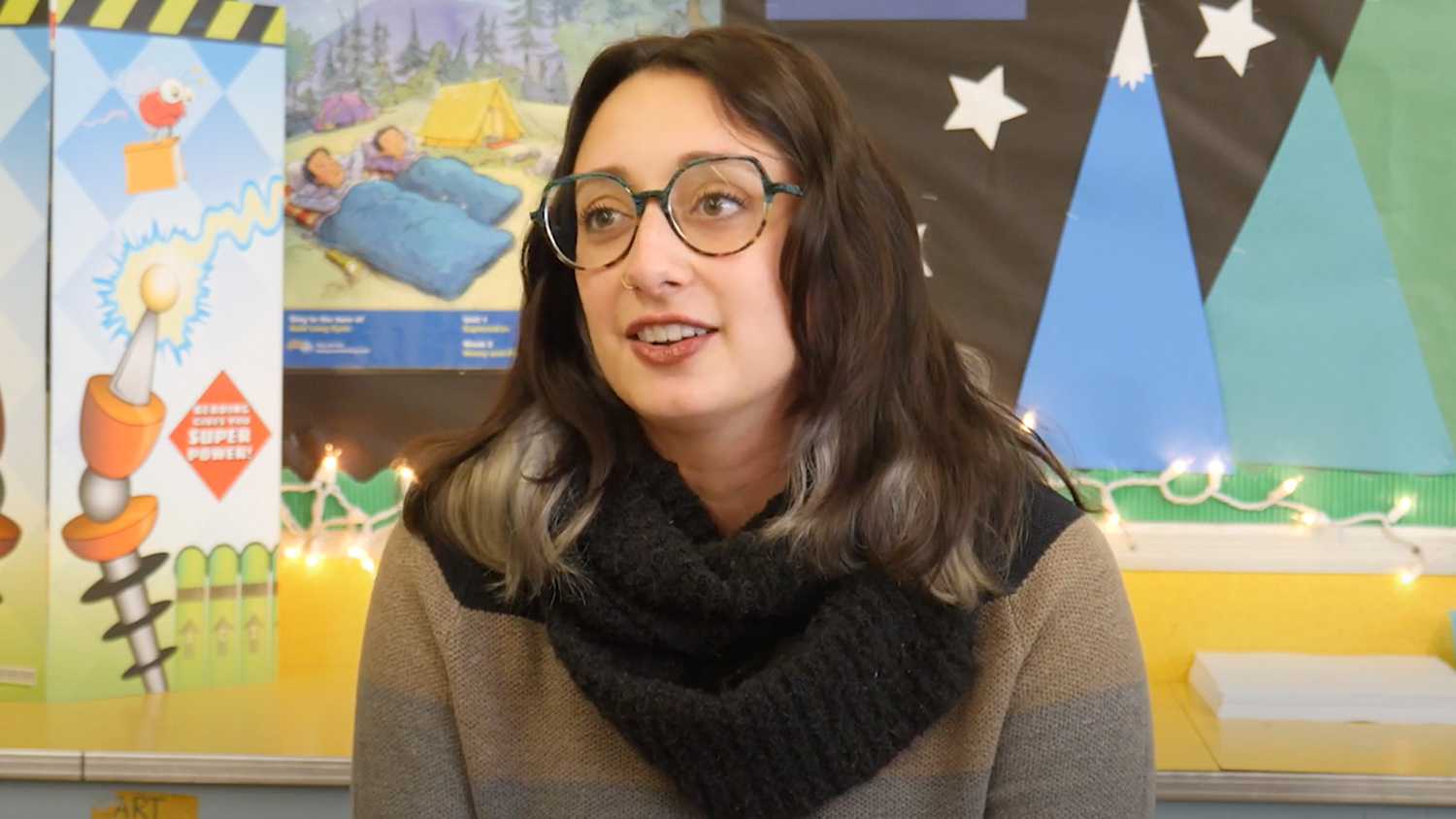Designed for educators and other professionals who recognize the academic, social, emotional and career needs of students, and who wish to gain the skills necessary to help students grow and achieve. With a focus on multicultural competence, school counselors are prepared to advocate for the needs of all students.
Why NC State’s School Counseling Program
- Complete courses on-campus or online in as little as two years
- Participate in hands-on school counseling experiences in a K-12 school through a 100 hour practicum and 600 internship hours and gain full academic experience in a school
- Our program is 1:1 with iPad minis for each student for the duration of their program
- Learn from nationally recognized faculty who have K-12 classroom and school counseling experience
- All students graduate having fulfilled the requirements for both, their N.C. School Counseling license, as well as their Licensed Clinical Mental Health Counselor Associate (LCMHCA), expanding their options for employment post-graduation
Program Details
Program Description
This M.Ed. in school counseling is designed to prepare students who can work with professionals in different fields to promote wellness and benefits of their clients. This program prepares students for counseling and advising positions in student service agencies in colleges and universities. Both on-campus and online deliveries are accredited by the Council for the Accreditation of Counseling and Related Educational Programs (CACREP) till March 30, 2030.
Our program emphasizes:
- Multiculturalism
- Scientist-Practitioner Model
- School-College-Community Collaboration Model
- Clinical Counseling Theory and Practice
- Developmental Theory
Course of Study
On-Campus Option
Students who enroll full-time and begin their studies in the summer session of their first year in the program can conceivable complete the program in two years by adhering to the following sequence:
- Summer Session I
- Summer Session II
- Fall Semester
- Spring Semester
- Summer Session I
- Summer Session II
- Fall Semester
- Spring Semester
Students who are unable to follow this sequence will need at least three years to complete the program as all internships are conducted during the spring semester.
Online Option
The online curriculum is a three-year, part-time cohort program that requires students to take courses year-round including summer. Students begin in Summer Session I, and typically take two online classes in fall and in spring.
Course descriptions can be found in the university course catalog.
Core Courses
- ECD 510 – Orientation to Professional Counseling, Identity, and Ethics (3 credits)
ECD 524 – Career Counseling and Development (3 credits)
ECD 525 – Multicultural Counseling (3 credits)
ECD 530 – Theories of Counseling (4 credits)
ECD 533 – Introduction to School Counseling (4 credits)
ECD 539 – Group Counseling (3 credits)
ECD 540 – Gender Issues in Counseling (3 credits)
ECD 541 – Substance Abuse Counseling (3 credits)
ECD 542 – Research Issues (3 credits)
ECD 545 – Counseling Couples and Families (3 credits)
ECD 546 – Crisis Counseling (3 credits)
ECD 561 – Strategies for Clinical Assessment in Counseling (3 credits)
ECD 562 – Techniques in Counseling (4 credits)
ECD 575 – Multicultural Life Span Human Development (3 credits)
ECD 642 – Practicum in Counseling (3 credits)
ECD 651 – Internship in School Counseling (6 credits)
ECD 651 – Internship in School Counseling (6 credits)
Students are eligible to take the National Counselor Examination (NCE) in the final semester of the program. Completion of a master’s degree in counseling and passing the NCE are two of the prerequisites for becoming a Licensed Professional Counselor, a career goal for many of our students.
Admissions Requirements
- Completed online application, resume and non-refundable application fee
- Our masters program is no longer requiring the GRE/MAT exam.
- Three recommendations from people who know your academic record and potential for graduate study (letters should be uploaded online)
- A personal statement answering the prompts detailed in the application. Personal statements should not exceed 5 pages, double spaced, using 12 point Times New Roman
- Official* transcripts of all post-secondary education
- Official** statement of English Proficiency (TOEFL) for international students
Our admissions requirements align with the CACREP standards and admission decision recommendations, which includes consideration of each applicant’s
- relevance of career goals,
- aptitude for graduate-level study,
- potential success in forming effective counseling relationships, and
- respect for cultural differences.
Applications and all supporting documents must be received on or before the Graduate School priority deadlines or the program deadlines. International students should also consider their specific deadlines, whichever is earlier.
The Graduate School
North Carolina State University
Research Building III, Room 240
1005 Capability Drive, Box 7102
Raleigh, NC 27695
Tuition and Fees
Review the Estimated Cost of Attendance associated with this master’s degree for the upcoming semester tuition and fees. Note that tuition and fees are subject to change.
Requirements for Counselors Pursuing School Counseling Licensure
To earn a school counseling license, you must be a graduate of a 60-hour CACREP accredited master’s program in counseling (e.g. School Counseling, Clinical Mental Health, College Counseling, Career Counseling). At this time, students in our program need to enroll in ECD 533 (SummerII) and ECD 651 (Fall) to become eligible for a N.C. School Counseling license. Contact Assistant Professor Adria Dunbar with any questions.
About the Counselor Education Program and Accreditation
Adopting the School-College-Community Collaboration Model, we prepare students who can work with professionals in different fields to promote wellness and benefits of the clients while maintaining a commitment to multiculturalism. In addition to the traditional core on developmental theory and the design and implementation of preventive interventions based on this theory, the program focuses on clinical counseling theory and practice. Another major focus is the commitment to multiculturaism, which is reflected in the required coursework and in the faculty-student community. Both the on-campus and online deliveries are accredited by the Council for the Accreditation of Counseling and Related Educational Programs (CACREP).
Accreditation: NC State is accredited by SACS until 2024 and all the counseling programs are eligible for renewal of accreditation by CACREP March 31, 2024.
Founded in 1946, the Counselor Education Program at North Carolina State University has had a long and rich history of contributing to the needs of North Carolina and the nation.
In the design of the curriculum and throughout each course, the student’s competence in theory and practice is important. Students participate in individualized field experiences appropriate to their area of study in settings on and away from campus.
In light of our focus on multiculturalism, we are particularly interested in attracting students from culturally-diverse backgrounds. In recent years, we have increased the proportion of culturally-different students from less than 5% to almost 20% of our degree candidates. Our curriculum content acknowledges the significance of cross-cultural perspectives in counseling theory, research and practice.
Mission
The Counselor Education Program at NC State shares the university’s land-grant mission. Through our Scientist-Practitioner and School-College-Community Collaboration Model, we train culturally competent counselors and counselor educators who are able to work collaboratively across settings to effectively lead, serve and advocate for the academic, career, personal and social development of children, adults, families and communities.
Vision
Our vision is to advance the frontiers of knowledge. Advanced video, computer, and networking technologies do and will continue to link Counselor Education graduate students and faculty with regional, state, national and international partners in teaching, research and service endeavors designed to offer hope to persons with the least access to educational and career opportunities afforded by life in the 21st century.
Faculty
Faculty in the Counselor Education Program:
- Alex Becnel, Assistant Professor, Counselor Education, ELPHD Department
- Rawn Boulden, Assistant Professor, Counselor Education, ELPHD Department
- Cristina Braga, Assistant Teaching Professor, Online Clinical Mental Health Counseling Coordinator, Counselor Education, ELPHD Department
- Nicole Childs, Assistant Teaching Professor, GCCE Coordinator, Counselor Education, ELPHD Department
- Briana Gaines, Assistant Teaching Professor, Counselor Education, ELPHD Department
- Marc Grimmett, Professor, Program Coordinator, Counselor Education, ELPHD Department
- Rolanda Mitchell, Assistant Professor, Online School Counseling Coordinator, Counselor Education, ELPHD Department
- Sylvia Nassar, Professor, Counselor Education, ELPHD Department
- Brean’a Parker, Assistant Professor, On-Campus Clinical Mental Health Counseling Coordinator, Counselor Education, ELPHD Department
- Jose Picart, Senior Faculty Fellow, Friday Institute for Educational Innovation, Professor of Counselor Education, ELPHD Department and Executive Director, Wake Partnership for Postsecondary Success
- Angela Smith, Teaching Professor, Online College Counseling and Student Development Coordinator, Counselor Education, ELPHD Department
- Terri Tilford, Assistant Teaching Professor, Clinical Coordinator, Counselor Education, ELPHD Department
- Siu-Man Raymond Ting, Professor, and Director of Graduate Programs, On-Campus College Counseling and Student Development Coordinator, ELPHD Department
we offer two options for you
On-campus Counseling Program
Online Counseling Program
Hear from one of our graduates
Why study school counseling at NC State’s College of Education
Graduate having fulfilled the requirements for a N.C. School Counseling license as well as a LPCA
Gain full academic experience in a school with hands-on school counseling experiences in a K-12 school
Complete courses on-campus or online in as little as two years
“Studying school counseling gave me the tools to support my students socially and emotionally, and to help prepare them for their future. I was drawn to the NC State College of Education because of its reputation and rigorous coursework.”
Mollie Tucker ’19MED

